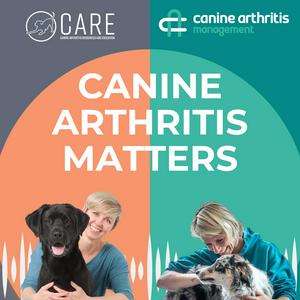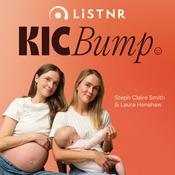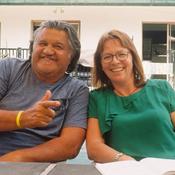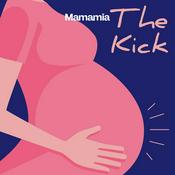73 episodes
Episode 73 - MicroRNAs - tiny molecules, powerful diagnostics, early disease detection - Eva Hanks
17/2/2026 | 1h 1 mins.February at Canine Arthritis Matters focuses on identification — and in this episode we explore what early identification of osteoarthritis could look like in the future.
Hannah Capon is joined by Dr Eva Hanks, CEO and founder of MI:RNA, to discuss the emerging role of microRNA (miRNA) biomarkers in detecting canine osteoarthritis at a molecular level.
We know that most dogs are diagnosed with OA once structural damage is already present. Subtle behavioural, postural and gait changes are often missed or dismissed. So what if we could detect disease before radiographic change, before overt lameness, before chronic pain becomes entrenched?
Dr Hanks explains what miRNAs are, how they function biologically, and why they may act as measurable indicators of early pathological change. This conversation explores the human evidence base, the current state of canine research, the challenges of variability between breeds and individuals, and whether the veterinary profession is ready to adopt biomarker technology as part of routine identification strategies.
This is a forward-looking discussion about moving from subjective suspicion to objective identification — and what that could mean for the future of canine osteoarthritis management.
Guest Bio
Dr Eva Hanks is CEO and founder of MI:RNA, a veterinary diagnostics company focused on early disease identification through biomarker technology combined with artificial intelligence. MI:RNA is a spin-out from Scotland’s Rural College (SRUC).
Dr Hanks began her career in busy mixed practice before returning to academia to complete an advanced certificate, followed by a PhD in immunology. She later worked as a clinical pathologist before launching MI:RNA in 2019, bringing together research, clinical insight and diagnostic innovation to improve early disease detection in companion animals.
5 Key Takeaways
1. We currently identify osteoarthritis too late, often after structural joint damage and chronic pain patterns are established.
2. MicroRNAs are regulatory molecules that reflect active biological processes and may allow identification of osteoarthritis at a molecular stage before visible joint changes occur.
3. Human meta-analyses show strong diagnostic accuracy for miRNAs in OA, but robust canine validation is essential before widespread clinical adoption.
4. Objective biomarkers could complement clinical assessment, helping bridge the gap between caregiver-reported subtle changes and definitive diagnosis.
5. Early identification opens the door to earlier lifestyle modification, weight management, activity optimisation and targeted intervention — shifting OA management towards prevention of progression rather than reaction to damage.
Relevant Links
MI:RNA
https://www.mirna.co.uk
Scottish Rural College (SRUC)
https://www.sruc.ac.uk
Learn more about CAM:
Facebook: https://www.facebook.com/CAMarthritis
Instagram: https://www.instagram.com/canine_arthritis
Youtube: https://www.youtube.com/c/CanineArthritisManagement
LinkedIn: https://www.linkedin.com/company/canine-arthritis-management-ltd
Have questions send them to: [email protected]
Stay tuned to learn how early detection can make a significant difference in managing OA in younger dogs.- In this episode, Dr. Hannah Capon speaks with Dr. Rachel Dean about the complexities of identifying arthritis early, the need for better contextualised care, and the shared responsibilities between caregivers and professionals. They explore what evidence shows about how OA is actually recognised in practice, why early signs are routinely missed, and how communication, telemedicine and structured preparation can dramatically improve outcomes. Dr. Dean also discusses neutering evidence, the role of telemedicine for chronic disease, and why evidence-based veterinary medicine (EBVM) underpins every decision we make. This conversation reinforces a core truth: early recognition of arthritis is achievable, but only if we broaden our observational habits, strengthen collaboration, and align interventions with real-world context.
GUEST BIO
Dr. Rachel Dean qualified in 1996 and has held influential roles across clinical practice, research, shelter medicine and academia. She is the founding director of the Centre for Evidence-based Veterinary Medicine at the University of Nottingham, former Associate Professor of Feline Medicine, Founding President of the Association of Charity Vets, and Editor-in-Chief of the BSAVA Manual of Shelter Medicine. She holds a Masters in evidence-based medicine, a PhD in epidemiology, a Diploma in feline medicine, and is a Senior Fellow of the Higher Education Academy. She is now Director of Clinical Research and Excellence in Practice at VetPartners, leading their Clinical Board and Learning & Development teams.
KEY TAKEAWAYS
1. Early arthritis is most often detected through subtle behavioural and lifestyle changes rather than clear lameness, making caregiver observations essential.
2. The Dean–Belshaw–Asher study shows a significant mismatch between what caregivers report and what clinicians focus on during consults, which can delay diagnosis.
3. Effective contextualised care requires collaboration: caregivers documenting changes and clinicians asking more precise, targeted questions.
4. Telemedicine can support earlier recognition by capturing movement, behaviour and environmental clues that are missed in-clinic.
5. Prevention and early management hinge on lifestyle adjustments, structured monitoring and proactive intervention, not necessarily costly treatments.
RELEVANT LINKS
Suspicion of Chronic Pain Tool
https://caninearthritis.co.uk/memberzone
Could it be osteoarthritis? (Dean, Belshaw, Asher)
https://bvajournals.onlinelibrary.wiley.com/doi/abs/10.1002/vetr.5488
Original paper PDF
https://www.cabidigitallibrary.org/doi/pdf/10.5555/20230279084
Good Day Bad Day Diary – in the Member Zone
https://caninearthritis.co.uk/memberzone
Learn more about CAM:
Facebook: https://www.facebook.com/CAMarthritis
Instagram: https://www.instagram.com/canine_arthritis
Youtube: https://www.youtube.com/c/CanineArthritisManagement
LinkedIn: https://www.linkedin.com/company/canine-arthritis-management-ltd
Have questions send them to: [email protected]
Stay tuned to learn how early detection can make a significant difference in managing OA in younger dogs. Episode 71 - Identifying Early Indicators of Arthritis: Why Observation Matters - Katrin Jahn
03/2/2026 | 41 mins.In this episode, Dr. Hannah Capon speaks with veterinary behaviour specialist Dr. Katrin Jahn about why arthritis is so often missed, how subtle behaviour and lifestyle changes can signal discomfort long before lameness appears, and how structured observation helps bridge the gap between caregivers, trainers and veterinary professionals. Together they explore the early indicators of chronic pain, the value of simple tools that guide objective reporting, and how better communication leads to earlier intervention and improved long-term welfare. This episode reinforces that arthritis is not just a mobility issue, but a whole-dog condition that requires careful observation, teamwork and timely action.
GUEST BIO
Dr. Katrin Jahn is a veterinary behaviour specialist and founder of Trinity Veterinary Behaviour, with extensive experience supporting complex behaviour and medical cases across multiple countries. Her work focuses on the intersection between emotional wellbeing and physical health, helping caregivers and professionals recognise when pain is influencing behaviour. Katrin is committed to promoting accessible tools, collaborative case management and improved welfare through better early identification of chronic pain.
KEY TAKEAWAYS
• Arthritis rarely starts with an obvious limp; behavioural and lifestyle changes are often the first clues
• Pain influences emotion, capability, mobility, and appearance – observing patterns over time is essential
• Trainers and caregivers play a crucial role in spotting early signs, and structured reporting improves accuracy
• Communication gaps between caregivers, trainers and vets often delay diagnosis
• Simple tools, used consistently, can guide earlier identification and therefore earlier intervention
• Chronic pain management requires shared responsibility across all professionals involved
• Prevention starts with knowing what to look for – observation is the foundation of early arthritis detection
RELEVANT LINKS
Suspicion of Chronic Pain Tool - [https://caninearthritis.co.uk/wp-content/uploads/2022/04/Suspicion-of-Chronic-Pain-Observations-Form.pdf](https://caninearthritis.co.uk/wp-content/uploads/2022/04/Suspicion-of-Chronic-Pain-Observations-Form.pdf "")
link to the tool in the memberzone - [https://caninearthritis.co.uk/member-zone/](https://caninearthritis.co.uk/member-zone/ "smartCard-inline")
Trinity Veterinary Behaviour – Professional Guides
https://www.trinityvetbehaviour.com
CAM Member Zone
https://caninearthritis.co.uk/memberzone
Learn more about CAM:
Facebook: https://www.facebook.com/CAMarthritis
Instagram: https://www.instagram.com/canine_arthritis
Youtube: https://www.youtube.com/c/CanineArthritisManagement
LinkedIn: https://www.linkedin.com/company/canine-arthritis-management-ltd
Have questions send them to: [email protected]
Stay tuned to learn how early detection can make a significant difference in managing OA in younger dogs.Episode 70 - Identifying arthritis earlier and taking a preventative approach - David Dycus
27/1/2026 | 1h 14 mins.In this episode, Hannah speaks with orthopaedic surgeon and rehabilitation expert Dr David Dycus to examine the real challenges of early arthritis detection. Together, they explore why early identification is often missed, what responsibilities both caregivers and professionals share, and which interventions truly shift the trajectory of osteoarthritis.
Aligned with CAM’s January prevention theme, this conversation highlights how critical early lifestyle decisions are for long-term joint health. Many of the most effective interventions are neither invasive nor expensive: bodyweight control, activity optimisation, home adaptation, and proactive monitoring form the foundation. Hannah also taps into Dr Dycus’s extensive orthopaedic and rehabilitation experience, asking how he approaches cases where pain is the only visible sign and what he recommends for both early and moderate disease.
The LIVE concludes with CAM’s signature segment: Ten Top Tips for managing your arthritic dog (from 1:02:00 in the original video).
Guest Bio
Dr David Dycus obtained his veterinary degree at Mississippi State University’s College of Veterinary Medicine, completed a small-animal rotating internship at Auburn University, and returned to Mississippi State for a combined surgical residency and Master’s degree. He sits on the research committee of the American College of Veterinary Surgeons and has a strong clinical and research interest in arthritis, joint disease, regenerative medicine, and minimally invasive orthopaedic surgery.
Dr Dycus is trained in arthroscopy, minimally invasive fracture repair, and advanced procedures for cruciate ligament injury. He gained stem-cell certification in 2010 and became a certified canine rehabilitation practitioner through the University of Tennessee in 2015. He is co-founder and co-director of the Veterinary Sports Medicine and Rehabilitation Institute (VSMRI), an online rehabilitation education platform, and is the founder and CEO of Dycus Veterinary Consulting.
https://www.vsmri.com/
Key Takeaways
1. Early identification of arthritis is a shared responsibility between caregivers and veterinary professionals.
2. Many impactful interventions are lifestyle-based, low-cost, and can be implemented long before medication is needed.
3. Pain as the sole clinical sign is easy to miss; subtle changes matter and should prompt assessment.
4. Early and moderate OA require different strategies, but both benefit from proactive monitoring and joint-friendly routines.
5. No intervention works alone; multimodal management started early has the greatest protective effect on long-term mobility.
Relevant Links
Veterinary Sports Medicine and Rehabilitation Institute (VSMRI):
https://www.vsmri.com/
CAM Member Zone:
https://www.caninearthritis.co.uk/member-zone/
Young Dog Joint Care Course (January Prevention Theme):
https://www.caninearthritis.co.uk/young-dog-joint-care/
January Prevention Theme – Young Dog Joint Care
Healthy joints start young. Learn how to reduce risk, support growth and spot early trouble signs with our Young Dog Joint Care Course.
https://www.caninearthritis.co.uk/young-dog-joint-care/
CAM Member Zone
Get deeper guidance, tools and downloads including the Good Day/Bad Day Diary, early-detection resources, and full LIVE recordings inside the Member Zone.
https://www.caninearthritis.co.uk/member-zone/
Learn more about CAM:
Facebook: https://www.facebook.com/CAMarthritis
Instagram: https://www.instagram.com/canine_arthritis
Youtube: https://www.youtube.com/c/CanineArthritisManagement
LinkedIn: https://www.linkedin.com/company/canine-arthritis-management-ltd
Have questions send them to: [email protected]
Stay tuned to learn how early detection can make a significant difference in managing OA in younger dogs.- In this episode, Hannah welcomes back Dr Dan O’Neil to expand on the latest findings from VetCompass, the companion animal surveillance programme based at the Royal Veterinary College. Building on his previous CAM appearance, Dr O’Neil explains how large-scale clinical data is helping us understand which disorders affect our dogs most frequently, why they occur, and how this knowledge can improve welfare across all breeds.
As January at CAM focuses on prevention, this conversation highlights the essential role of early identification, awareness of developmental joint disease, and responsible decision-making throughout a dog’s early life. By understanding risk patterns across the wider population, caregivers and professionals can take meaningful steps to protect joint health long before clinical arthritis develops.
Originally published as a LIVE broadcast in January 2024
Guest Bio
Dr Dan O’Neil is Associate Professor in Companion Animal Epidemiology at the Royal Veterinary College and co-lead of the VetCompass Programme. After 22 years in both small and large animal practice, he completed an MSc in epidemiology in 2009 and a PhD in 2014 focused on developing VetCompass, now a global leader in companion animal health surveillance.
He has authored over 100 scientific papers on breed health and therapeutics, co-authored the books Breed Predispositions to Disease in Dogs and Cats and Health and Welfare of Brachycephalic Companion Animals, and chairs the UK Brachycephalic Working Group. His work has been recognised with multiple honours including Fellowship of the Royal College of Veterinary Surgeons, the BSAVA Blaine Award and the International Canine Health Award. His ethos is simple and powerful: we must understand the world better in order to make it better.
Key Takeaways
1. Developmental joint disease is a major driver of lifelong mobility problems, making prevention in young dogs essential.
2. Surveillance data challenges assumptions and provides evidence-based insight into true disease prevalence and risk.
3. Breed-related risk varies significantly and must be considered when making breeding, acquisition and lifestyle decisions.
4. Prevention is multi-layered and includes genetics, growth, body condition, environment and early monitoring.
5. Data-driven understanding empowers caregivers and professionals to intervene earlier and reduce long-term suffering.
Watch the Original LIVE - https://youtube.com/live/fJ0cE1vfztc
Relevant Links
Previous CAM episode with Dr Dan O’Neil:
https://youtu.be/NiZ47eews6c
VetCompass Programme information:
https://www.rvc.ac.uk/vetcompass
January Prevention Theme – Young Dog Joint Care
Prevention starts early. Our Young Dog Joint Care Course is designed to help caregivers understand risk factors, support healthy development, and reduce the likelihood of joint disease later in life.
https://www.caninearthritis.co.uk/young-dog-joint-care/
CAM Member Zone
Join the CAM Member Zone for deeper education, practical tools, downloadable resources including the Good Day / Bad Day Diary, and ongoing support for preventing and managing chronic pain.
https://www.caninearthritis.co.uk/member-zone/
Learn more about CAM:
Facebook: https://www.facebook.com/CAMarthritis
Instagram: https://www.instagram.com/canine_arthritis
Youtube: https://www.youtube.com/c/CanineArthritisManagement
LinkedIn: https://www.linkedin.com/company/canine-arthritis-management-ltd
Have questions send them to: [email protected]
Stay tuned to learn how early detection can make a significant difference in managing OA in younger dogs.
More Kids & Family podcasts
Trending Kids & Family podcasts
About Canine Arthritis Matters
Welcome to Canine Arthritis Matters, your go-to resource for canine health and wellbeing. Hosted by Dr. Hannah Capon, our podcast provides valuable insights and practical advice on managing canine arthritis, mobility issues, and chronic pain. Our goal is to educate and support dog owners in early identification, proactive management, and comprehensive care practices, ensuring dogs lead long, comfortable, and happy lives. Join us on this journey to improve the quality of life for your furry friend.
Have questions send them to: [email protected]
https://caninearthritis.co.uk/
Podcast websiteListen to Canine Arthritis Matters, We Don't Have Time For This and many other podcasts from around the world with the radio.net app

Get the free radio.net app
- Stations and podcasts to bookmark
- Stream via Wi-Fi or Bluetooth
- Supports Carplay & Android Auto
- Many other app features
Get the free radio.net app
- Stations and podcasts to bookmark
- Stream via Wi-Fi or Bluetooth
- Supports Carplay & Android Auto
- Many other app features


Canine Arthritis Matters
Scan code,
download the app,
start listening.
download the app,
start listening.







































